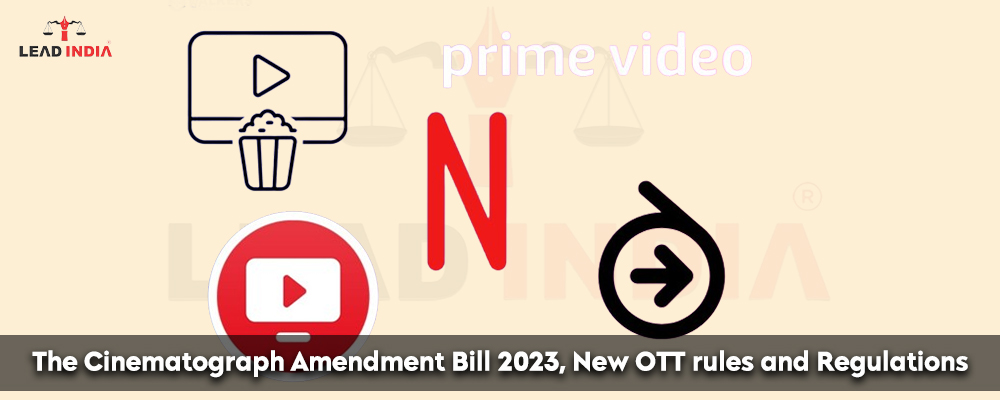On July 31, 2023, the Parliament enacted the Cinematograph (Amendment) Bill, 2023, which revised the Cinematograph Act, of 1952, reinforcing India’s film piracy laws. It is now illegal to record audio videos in any location designated for film exhibition. The bill also includes new forms of film certifications.
The Cinematograph Act of 1952 (‘the 1952 Act’) is the primary regulation that governs the display of cinematograph films in India by certifying them based on a specified viewership. It had previously been revised eight times.
Need A Legal Advice
The internet is not a lawyer and neither are you. Talk to a real lawyer about your legal issue

Cinematograph (Amendment) Bill 2023
- The bill added two new parts, parts 6AA and 6AB. These two clauses ban not only the use of audio-visual recording equipment to manufacture, transmit, or present an “infringing copy” of a film or any part of it from a location authorized to show the film but also the attempt or facilitation of such activities.
- As per the Cinematograph Amendment Bill’s Section 7 (1A), individuals who breach Sections 6AA and 6AB will face a minimum sentence of three months in prison, but not more than three years, and shall be fined not less than three lakh rupees, but not more than 5% of the film’s gross production cost, against those found making pirated films.
- Consuming or watching an illegally duplicated version, a leaked copy of the film, or unlicensed content is not punished; nonetheless, downloading such content makes you the distributor of that film. The Bombay High Court has also stated that viewing pirated content is not criminal.
- The goal of granting age-based certification under Section 5A is to differentiate which audio-visual content is appropriate for different groups of people. Section 5A of the Cinematograph Act of 1952 gives four rating categories.
Later in 2021, people from various arenas, be it civil society, trade organizations, and associations, or filmmakers, demanded that OTT platforms like Netflix, Amazon Prime, or Hotstar classify their content or films into different categories and demanded government intervention, so the Information Technology (Intermediary Guidelines and Digital Media Ethics Code) Rules, 2021, required the OTT platforms such as Netflix, Amazon Prime, or Hotstar to self-classify their content.
So, according to the present Cinematograph Amendment Bill, 2023, the four categories, U, A, S, and U/A, are divided into U/A 7+, U/A 13+, and U/A 16+. This decision was made by the IT Rules, 2021, regarding age-based certification for streaming platforms.
- Section 4(3) of the Cinematograph Amendment Bill, 2023, has been amended to allow the board to sanction a film whose public screening is restricted to adults or particular members of any profession with a separate certificate for television or other media as prescribed.
- The Cinematograph Act of 1952 stipulates that any certification given by the board to deem a film audience worthy would be valid throughout India “for 10 years,” as per Section 5A(3). However, the new Cinematograph Amendment Bill of 2023 removes the phrase “for 10 years” from the 1952 act, meaning that the certificate granted to the films will remain valid for an indefinite amount of time.
- Section 6 (1) of the Cinematograph Act, 1952, which gave the Union Government revisional power, has been removed from the Cinematograph Amendment Bill, 2023. This means that the government will be able to make decisions about the certification of films, endangering the independence of CBFS by putting a quasi-judicial body under the executive’s scrutiny. But if you look through the earlier Cinematograph amendment bills, such as those from 2019 and 2021, you will see that attempts have been made repeatedly to stifle the quasi-judicial body’s certification decision without the necessary legislation, even after the Apex Court’s 2000 ruling in Union of India v. K.M. Shankarappa, which declared Section 6(1) unconstitutional.
Lead India offers free legal advice and online information, in addition to other legal services. We provide a forum to speak with a lawyer and ask legal questions. Lead India’s solicitors can help you with any legal difficulties. Lead India’s solicitors may assist you with any legal issues. Lead India also provides free online legal help in India. In addition to giving online legal assistance, Lead India allows users to ask specialist questions for free.





 Talk to a Lawyer
Talk to a Lawyer